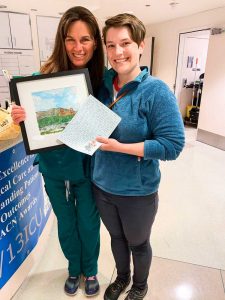Providers Who Go the Extra Mile to Support ICU Families
Written by |

I recently spoke to Dr. Heidi Engel, the physical therapist who directed my mom’s pulmonary rehabilitation while she was in the ICU at the University of California, San Francisco. We discussed ICU relationships and how providers can better support family members who are experiencing the trauma of having a loved one in the ICU.
My mom, Holly, was in the hospital for four months when she was waiting for and then recovering from her double lung transplant. She spent three of those months in the ICU. More doctors, nurses, and therapists than I can count provided constant medical support for her. A social worker also checked in once or twice a week to provide psychological support for our family.
I have nothing but good things to say about the care at UCSF. I never felt like any of the doctors who were on my mom’s case were not taking it seriously or didn’t have time to field questions. They explained complicated things in language that we could understand. They inspired confidence and calm in the face of a situation that seemed to me to be out of control. Everyone collaborated, and they always kept us in the loop. It was remarkable.
When Heidi and I were talking about the relationships between providers and families in the ICU, I recalled some things that made all the difference to me as a family member. I easily could have felt chaotic, hopeless, and terrified every day my mom was in the ICU. Because of these and other thoughtful providers, I felt informed, optimistic, and somewhat calm throughout the experience. I’m grateful for all the providers who went above and beyond for us. I hope that their examples will inspire other providers.
The one thing that set Dr. Meredith Adamo apart from other doctors was that she always pulled up a chair if we were sitting when she came to talk with us. She always came completely into the cramped room, sat down with us, and spoke to us at eye level. Her body language and the simple act of sitting made her seem more available and present.
It never felt like she was halfway out the door or towering over us dropping a bomb because she was not in those physical positions. She was in the room, on our level, giving and receiving information. If we had questions, she answered them in depth. It felt like our concerns were her only priority when she was there.
Another person who went the extra mile was Heidi, our physical therapist. This is evidenced by the fact that she spent 45 minutes on the phone with me last week, catching up and supporting me even now, months after my mom’s transplant.
When my mom was first admitted to the ICU, she was so sick that she could hardly walk out of her room before her lungs said “no more” and panic took over. It was bad. One of the requirements to get on the transplant list was that she had to be able to walk for six minutes, and she could barely walk six steps.
On day two of trying for six minutes, my mom collapsed into a wheelchair just outside her room. We stood there waiting for the anxiety to subside and her breathing to regulate. I could tell that she wanted to give up. She was freaked out and wanted to go back to bed. Heidi was not having it. She wasn’t going to give up, but more than that, she wasn’t going to let my mom give up on herself.
She knelt down and gave my mom a pep talk. It went a little like this: “You can’t breathe. Your brain literally thinks you are drowning, but you aren’t. You have this awesome ventilator to make sure you get enough oxygen and nitric oxide to keep your airways open. You have to convince your brain that you’re not going to die right now, because you aren’t. Mind over matter. You have all these people here to catch you if it gets hard, but you have to try or else you won’t improve.”
My mom got up and walked for six minutes. The next day, she doubled the distance. From that day until the day my mom was discharged, Heidi gave her just the right mix of encouragement, acknowledgment, and firm guidance. She didn’t take no for an answer, but she was never disrespectful.
So many other people and moments had a positive impact on our ICU experience, but these two are examples of support that made a huge difference in our attitudes and our outcome.
***
Note: Pulmonary Fibrosis News is strictly a news and information website about the disease. It does not provide medical advice, diagnosis, or treatment. This content is not intended to be a substitute for professional medical advice, diagnosis, or treatment. Always seek the advice of your physician or other qualified health provider with any questions you may have regarding a medical condition. Never disregard professional medical advice or delay in seeking it because of something you have read on this website. The opinions expressed in this column are not those of Pulmonary Fibrosis News or its parent company, Bionews Services, and are intended to spark discussion about issues pertaining to pulmonary fibrosis.








Leave a comment
Fill in the required fields to post. Your email address will not be published.